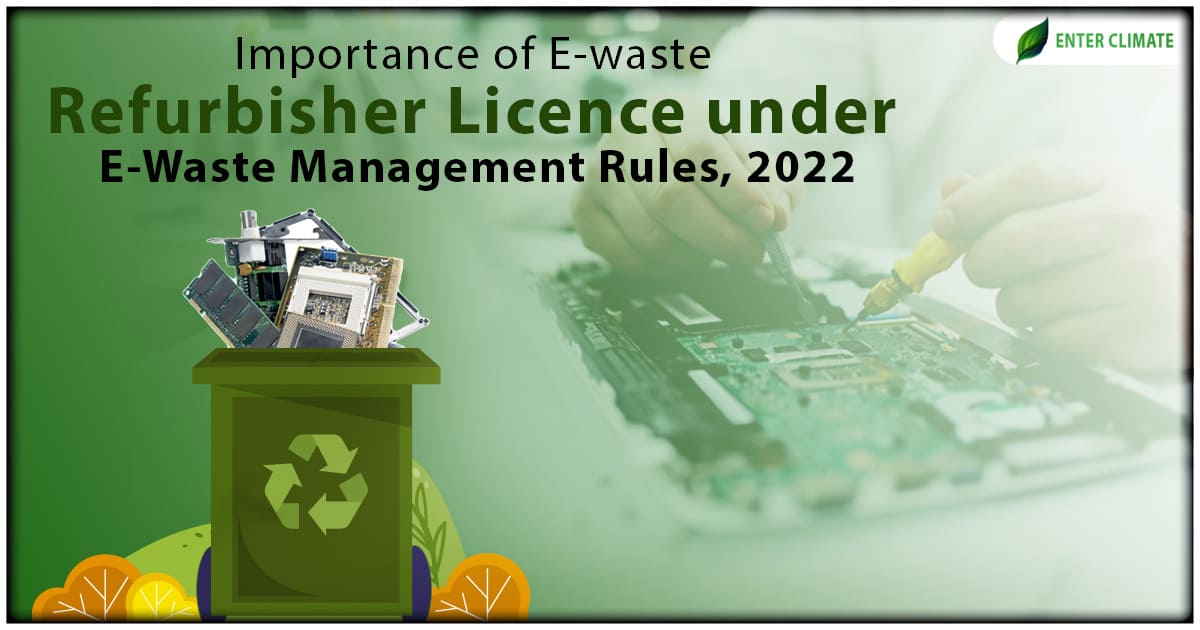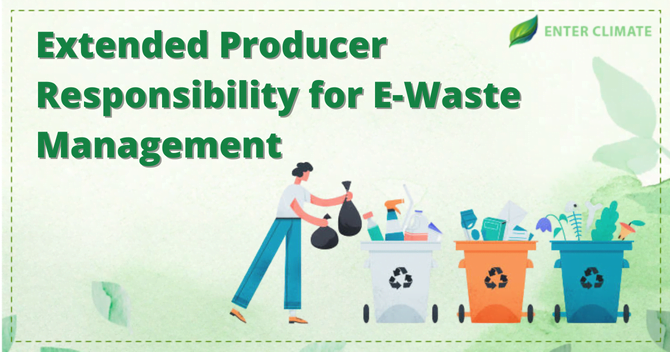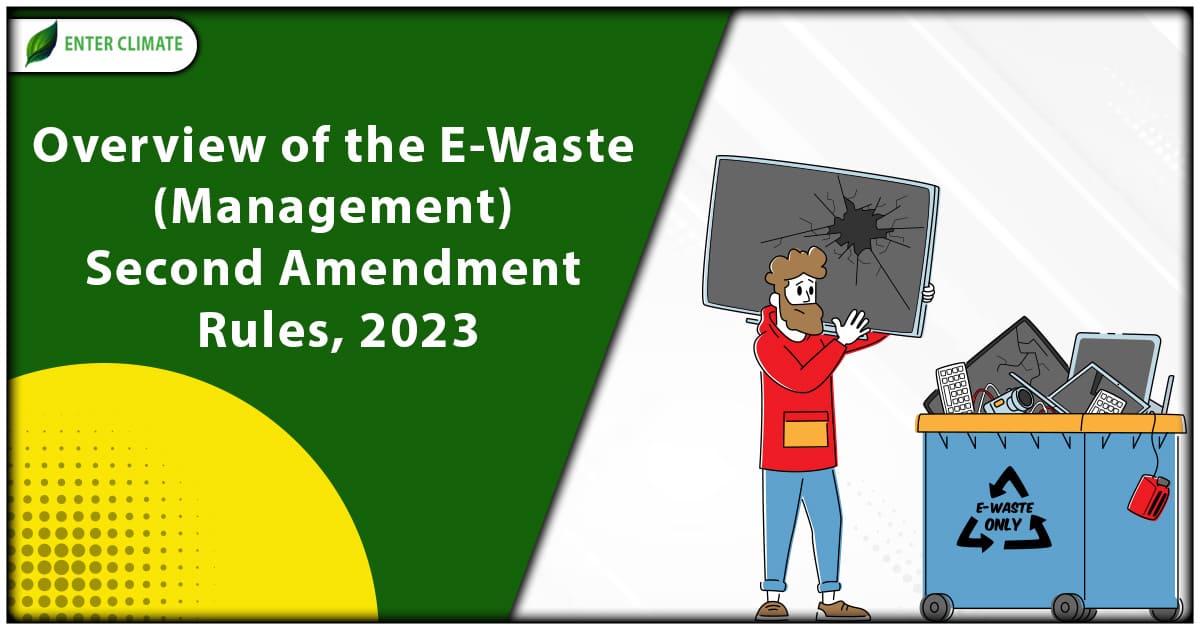Importance of E-waste Refurbisher Licence under E-Waste Management Rules, 2022
 25 Jul, 2023
25 Jul, 2023 
The regulations outlined in the E-Waste Management Rules 2022 apply to various entities involved in the manufacturing, sale, transfer, purchase, collection, storage, and processing of e-waste or electrical and electronic equipment. This includes manufacturers, producers, consumers, bulk consumers, collection centres, dealers, e-retailers, refurbishers, dismantlers, and recyclers. By the E-Waste Management Rules, refurbishment is defined as a process that enhances the quality of used electrical and electronic equipment listed in Schedule I, extending its lifespan while preserving its genuineness and originality. As defined within these rules, a refurbisher refers to any company or undertaking registered under the Factories Act, 1948 or the Companies Act, 1956, or both, or a district industries centre engaged in refurbishing used electrical and electronic equipment. The primary distinction between recycling and refurbishment lies in the utilisation of resources. However, both these businesses will be required to register on the CPCB EPR Portal under the E-waste Management Rules. In contrast, an e-waste Refurbisher licence will be needed if the business reuses the existing e-waste components in refurbishing the products.
Benefits of havingan E-waste Refurbisher licence
Refurbishing e-waste has the added advantage of replacing new materials with older ones. Customers familiar with the technology generally do not notice any difference in quality between refurbished and original products. In contrast, recycling often requires procuring new materials, while refurbishment utilises second-generation materials in manufacturing.
Refurbishment involves removing or repairing non-functional components, ultimately generating e-waste. In some cases, specific equipment may not be financially viable for refurbishment, leading to their classification as e-waste. Hence, it becomes the responsibility of the Refurbisher to appropriately dispose of the generated e-waste by the provisions specified in the E-Waste Management[1] Rules. The scope of the E-waste Refurbisher encompasses upgrading a wide range of products, such as computers, laptops, mobile devices, LED, television sets, refrigerators, and washing machines, along with their components, consumables, parts and spares necessary for their functionality.
Factors to consider while starting E-Waste Refurbishment Business
The following requirements must be fulfilled for setting up a Refurbishing business:
- The primary requirement is to have a dedicated and spacious location where all the E-waste can be stored separately from other equipment.
- It is important to have a closed space resembling a factory setup with a small footprint.
- Essential equipment for repairing and refurbishing the materials should be procured.
- Establishing a network with suppliers is crucial to ensure a steady supply of refurbished materials.
Responsibilities of a Refurbisherunder the compliance of E-waste Refurbisher licence
The Refurbisher’s responsibilities include the following:
- The Refurbisher collects the generated E-waste materials throughout the refurbishment process and ensures that the waste is sent to authorised dismantlers or recyclers.
- The Refurbisher must ensure that their refurbishment business does not contribute to any environmental degradation caused by the storage and transportation of E-waste.
- The Refurbisher is accountable for ensuring that their business activities do not harm public health or the environment.
- Keeping records of the E-waste handled is an obligation of the Refurbisher, and these records should be available for scrutiny by the relevant authority.
Categories of E-Waste included in E-waste Refurbisher licence
The categories of E-Waste are as follows:
Before starting a refurbisher business, it is important to be aware of the hazardous nature of electronic waste and its impact on human health and environmental degradation in India. Presently, India is ranked as the third-largest producer of E-waste globally. Experts estimate that over 1 million tons of electronic waste is generated in India annually. Additionally, a significant quantity of electronic products is imported from other countries, and when these products reach the end of their life, or their quality deteriorates, they contribute to the E-waste stream.
There are several categories of electronic items that contribute to E-waste each year, including:
- Computer devices, which make up approximately 70% of the annual E-waste.
- The telecom sector accounts for around 12% of the yearly E-waste.
- Medical devices and used equipment contribute roughly 8% of the annual E-waste.
- Both the government and private sectors together contribute 75% of the annual electronic E-waste.
- The household sector individually accounts for about 16% of the annual E-waste.
Understanding these categories and their respective contributions to E-waste is crucial for those venturing into the refurbishment business.
Process of applying foran E-waste Refurbisher licence
The process of applying for an E-waste Refurbisher licence is as follows
- Application Filing – Initially, the Refurbisher needs to register through the official online portal and complete Form-I (a) of the E-Waste (Management) Rules, 2016. Along with the application, attested documents and the applicable fee must be submitted.
- Application Submission/Review – The State Pollution Control Board (SPCB) reviews the application foran E-waste Refurbisher licence and performs verification and authentication. Any errors or mistakes identified in the submitted application are returned to the Refurbisher for rectification.
- Authorisation Grant for Refurbisher – Once the SPCB completes the necessary verifications, approvals, and No Objection Certificates (NOC), they authorise the refurbisher/license to operate.
Documents required for E-waste Refurbisher licence
Below are the documents required to be submitted:
- Form-1
- PAN Details
- Incorporation certificate
- TIN Details
- Business Owner Address Proof
- Proof of Possession- Sale deed or Rent agreement
- Electricity Bill
- Company Documents: MOA, Company Incorporation Documents, Partnership Deed
- Layout Map of Business Premises
Conclusion
Refurbishment is widely acknowledged as a more advantageous approach compared to recycling products. Its benefits extend beyond reducing e-waste; it also enhances the lifespan and functionality of the products. Consequently, refurbishment is preferable as it helps promote the circular usage of products in the economy instead of discarding the non-functional products as waste that leads to the loss of valuable resources and poses a potential risk to the environment. While starting a refurbishment business, it is advisable to seek the assistance of licencing and EPR experts during the E-waste Refurbisher licence application for precise guidance towards fulfilling EPR and other legalities associated with refurbishment.
FAQs
Certified refurbished products typically refer to pre-owned items that have been returned by customers.
After being returned, products that undergo refurbishment by the manufacturer undergo a thorough testing procedure to ensure they meet the manufacturer’s quality standards.
Irrespective of the specific terminology used, purchasing refurbished products is a favourable option because refurbished products have undergone restoration to ensure they are in complete working condition.
Yes, refurbished products are still original, as they undergo the same rigorous testing process, which enables any defects to be identified, repaired, and any faulty components to be replaced, ensuring that the refurbished product meets the required quality standards.
The Environmental Protection Agency (EPA) suggests employing certified electronic recyclers to handle the disposal of unwanted or used electronic devices.
With a well-crafted and clearly defined plan, the e-waste recycling business model can become profitable relatively quickly.
To commence an e-waste recycling business, it is necessary to submit various mandatory documents to obtain approval from the Pollution Control Board (PCB).
Obtaining EPR (Extended Producer Responsibility), Authorization is compulsory for electronic and electrical products such as laptops, computers, telephones, printers, washing machines, batteries, chargers, and more.
Extended Producer Responsibility (EPR) refers to the responsibility placed on Indian manufacturers or importers of electronic products to manage and handle e-waste. An EPR Certificate is mandatory for these manufacturers or importers as part of their commitment to proper e-waste management practices.
Extended Producer Responsibility (EPR) is a government policy that assigns significant responsibility to producers to treat and dispose of consumer goods.
Read our Article: How Will Recycling Businesses Benefit From Circular Economy In E-Waste Management?












